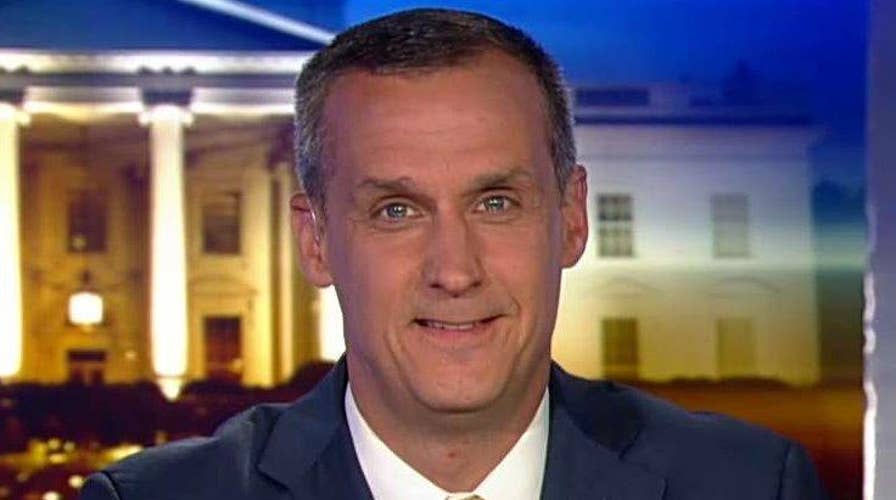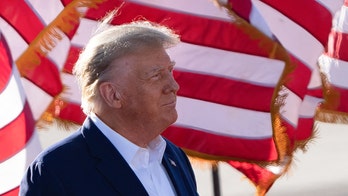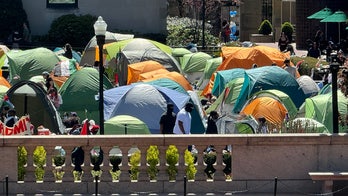Lewandowski: Trump asked Comey for loyalty to his country
Former Trump campaign manager Corey Lewandowski explains Trump's alleged request for former FBI director Comey's loyalty and says he was trying to develop rapport. Plus, perspective on Trump-Sessions rift
James Comey plans to testify Thursday that in the months before he was fired as FBI director, President Trump sought his “loyalty” while also pressing him to “lift the cloud” of the Russia investigation and lay off Michael Flynn, according to written testimony released ahead of his Senate committee appearance.
The prepared remarks for his opening statement, released by the Senate Intelligence Committee, also make clear that Comey repeatedly assured Trump he was not personally under investigation.
Comey's statement detailed several meetings he had with Trump dating back to January.
He extensively described a Jan. 27 dinner where he said Trump told him: “I need loyalty. I expect loyalty.”
Comey plans to say as well that Trump sought help ending any probe of former national security adviser Flynn, reiterating previously published reports about such claims.
Comey's testimony will mark his first Capitol Hill appearance since his firing a month ago. Lawmakers are eager to hear his side, amid a raft of reports suggesting Trump had pressured Comey over investigations of Russian meddling in the election and coordination with his associates.
Trump has denied pressuring Comey as well as any collusion with Russia.
If Comey's opening statement is any gauge, Thursday's testimony will be explosive.
The seven-page document, however, began with a piece of good news for the president -- confirming his past claims that Comey assured Trump "we were not investigating him personally." Comey first gave the assurance during their first meeting at Trump Tower on Jan. 6, during a discussion about a salacious and widely contested anti-Trump dossier, and reiterated the statement in subsequent conversations.
Republican National Committee Chairwoman Ronna Romney McDaniel highlighted those passages, tweeting Wednesday, “Comey’s testimony reconfirmed what @POTUS has been saying all along: The President was never under investigation.”
Comey went on to say he and the president later dined on Jan. 27 at the White House. This is when the conversation allegedly turned to "loyalty." He said Trump asked whether he wanted to stay on at the FBI, but after he made clear he was not on anyone's side politically, Trump pressed him on loyalty.
"I didn't move, speak, or change my facial expression in any way during the awkward silence that followed," Comey said in the statement.
Comey admitted that when Trump later said he wanted “honest loyalty,” Comey assured, “You will get that from me.” He later wrote in a personal memo he may have interpreted that term differently from Trump.
The testimony went on to describe a Feb. 14 Oval Office meeting, which concerns a key moment that later leaked into press reports and has fueled Congress’ interest in hearing from Comey post-firing.
Comey said that when he and Trump were alone, Trump asked to speak about Flynn, who had just resigned as national security adviser over misleading Vice President Pence over his contacts with the Russian ambassador. According to Comey, Trump said Flynn is a “good guy” and, “I hope you can let this go.”
Comey said he later prepared a memo about the conversation, noting that he understood Trump to be referring only to Flynn and not the broader Russia investigation:
“I had understood the President to be requesting that we drop any investigation of Flynn in connection with false statements about his conversations with the Russian ambassador in December. I did not understand the President to be talking about the broader investigation into Russia or possible links to his campaign. I could be wrong, but I took him to be focusing on what had just happened with Flynn’s departure and the controversy around his account of his phone calls.”
However, Comey said Trump called him on March 30 and complained that the Russia probe was a “cloud” over his administration. Comey claimed Trump asked what could be done to “lift the cloud.”
They last spoke on April 11.
Trump fired him a month later, with officials citing in part Comey’s controversial handling of the Hillary Clinton email case.
Late Wednesday, multiple Congressional sources from both sides of the aisle told Fox News that Comey's statement contained a level of detail, granularity and "puffery" of the sort that had "aggravated" them in previous encounters with the then-FBI director.
"Several of the sources have said that Comey’s statement was laced with “theatrics” in an effort to make certain events “appear more dramatic than they were.”
"It’s too cute,” said one source who has had multiple dealings with Comey behind closed doors. “I have never been so angry at a witness as I was at him.”
Fox News' Chad Pergram contributed to this report.





